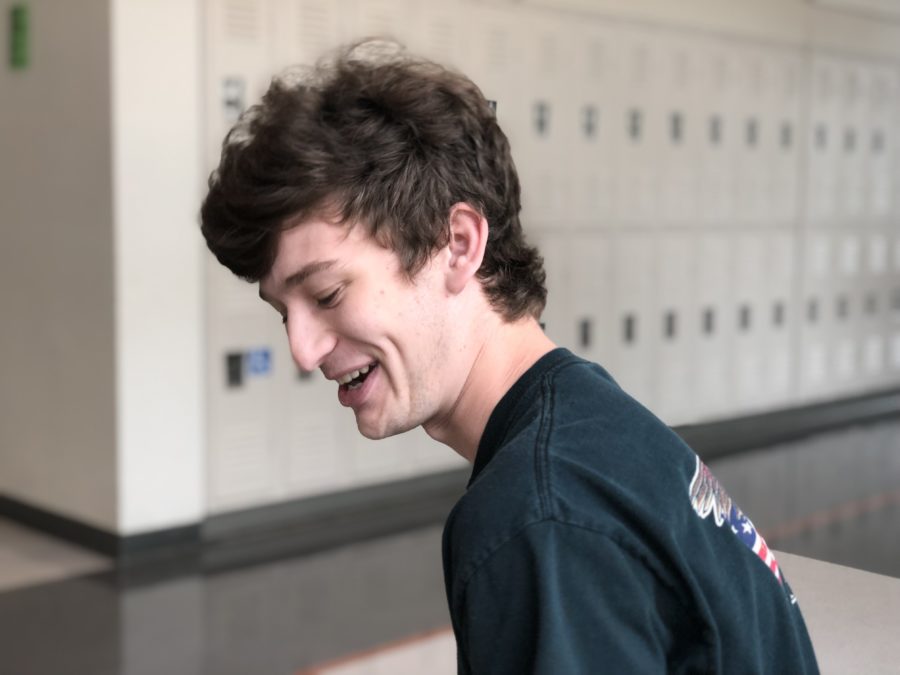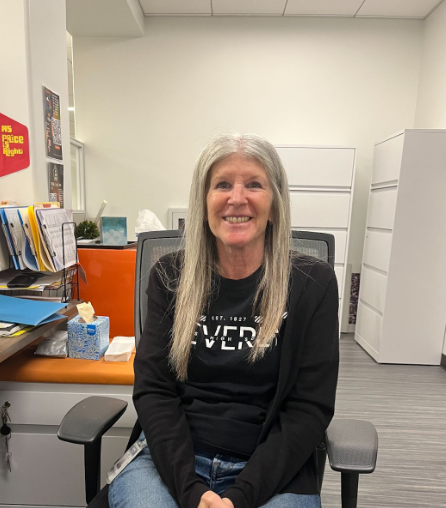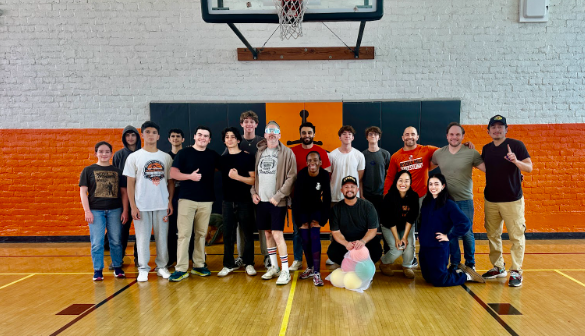This post is part of the Beginning Journalism class’s final. Everything was 100 percent produced independently by the cub writer(s) listed below.
Emma Newman cub writer
Chieh-Ning (Jenny) Ho cub writer
Confusion.
That was senior Jordan Kramer’s first reaction when he received his diagnosis of Tourette’s Syndrome. It wasn’t the shock that his mother felt after his diagnosis. It was simply confusion.
Kramer had been showing symptoms of Tourette’s Syndrome for a while, with the first sign showing up in kindergarten. However, his first tick, the uncontrollable popping of his shoulder back in its socket, did not lead to his diagnosis.
“The tick that my mom noticed that something was wrong was that I just twitched my face and that’s why she took me to the doctor,” Kramer said.
Due to his confusion, Jordan educated himself on his disorder immediately.
“His first instinct was to learn everything he could about it and share that information with other students and other people that helped him,” Kramer’s case worker and personal teacher, Molly Peterson said.
Nancy Kramer, Jordan’s mother, also learned more about Tourette’s Syndrome and other disabilities. She even discovered that she has a mild form of Tourette’s.
“I have learned a lot about disabilities – all sorts,” Nancy said. “I have become much more aware and understanding and accepting of things I had no clue about before. [I have become] more aware of how the process works in school and how the disability services work in school and more aware of the Americans with Disabilities Act and just more aware with what people [with disabilities] need in general.”
After his diagnosis, Jordan faced many challenges. The most difficult part of having Tourette’s, however, was not his ticks: it was informing others about his Tourette’s because some people did not understand what Tourette’s was.
“In … seventh or eighth grade, I had a substitute teacher and I walked into class and ticked and she didn’t know what it was,” Jordan said. “I told her…, ‘I have Tourette’s,’ and her response was, ‘No you don’t’ and I said, ‘Yeah, I do.’ My entire class stood up and goes, ‘He actually has Tourette’s.’ She goes, ‘No, he doesn’t.’ She was about to send me to the office and another teacher walked in. He was actually a teacher at El Rodeo and he said, ‘No. He actually has Tourette’s,’ and she felt really bad.”
Even some of Jordan’s closest friends were not supportive when finding out about his Tourette’s Syndrome.
“One of the most difficult things for him was that when his Tourette’s was really bad, a lot of his friends from middle school deserted him and that social pieces continued to be a problem for him [because] kids just don’t try to understand,” Molly Peterson said.
Another cause for his problems with friends stemmed from his other disorder: Attention-deficit/hyperactivity disorder (ADHD).
“He’s very impulsive and [he] kind of jumps in,” Nancy said. “[He] doesn’t mean to do it, but it turns people off, and it really hurts him when his friend weren’t there for him.”
The alienation that Jordan faced did not just hurt him emotionally: it actually had an impact on the severity of his Tourette’s, which is quite common among people with Tourette’s.
“[The other kids were] causing him an extreme amount of stress, which caused him to tick more,” Nancy said.
As a result of his increase in ticks, Jordan and Nancy decided that Beverly was not the right place for Jordan to attend high school full-time.
“We wanted to switch schools to a new surrounding of people,” Jordan said.
In order to have a more positive high school experience, Jordan has attended Fusion Academy, a school with only one child per class, since ninth grade. As a result, Nancy believes that he became a happier and a more successful human being.
“He thrived there,” Nancy said. “He didn’t have to worry about, when he was in class, ticking and disrupting somebody else. He didn’t have to worry about being ostracized by his friends anymore. For his emotional well-being, I thought Fusion would be better.”
Like Nancy, Molly Peterson believes that Jordan’s ticks lessened as a result of his attendance at Fusion.
“Now… he seldomly exhibits anything outwardly for very long that anybody would think he had anything going on other [than being] a teenage boy,” Peterson said.
Jordan is not only a student at Fusion Academy. He takes KBEV, and he is taking the same courses that any Beverly student would take at Fusion so he can receive a Beverly diploma.
However, he still predicts that he will have a difficult transition after graduating. He will be attending a public college, Cal State Long Beach, which is completely different from Fusion in terms of the number of students.
“[Going to Cal State Long Beach] is going to be hard,” Jordan said. “I haven’t had class with … another kid besides me since eighth grade besides KBEV… so I have to get used to going to school again.”
Even with all of these past and future struggles, though, Jordan still recognizes some of the opportunities and perks he has as a result of his Tourette’s.
“[Having Tourette’s] has opened so many doors for me, such as [when]I lobbied in D.C. It introduced me to so many great people with Tourette’s,” Jordan said. “It pretty much got me into college. So…I think that it’s changed my life in a good way.”
Jordan’s positive outlook on his Tourette’s does not just extend to himself, however. It also extends to other individuals who are being diagnosed with Tourette’s Syndrome.
“Don’t let [Tourette’s] scare you,” Jordan said. “Once you get used to it, it’s much easier to deal with and once you’re able to deal with it, it just kind of goes away.”


https://youtu.be/P1HPblJYqPM
Categories:
Tourette’s Syndrome: How it changed a teen’s life
May 30, 2019
Jordan Kramer, pictured, is being interviewed as he has several physical ticks. Kramer was diagnosed with Tourette’s when he was in fifth grade.
0
Donate to Highlights
$125
$1000
Contributed
Our Goal
Your donation will support the student journalists of Beverly Hills High School. Your contribution will allow us to purchase equipment and cover our annual website hosting costs.
More to Discover
































